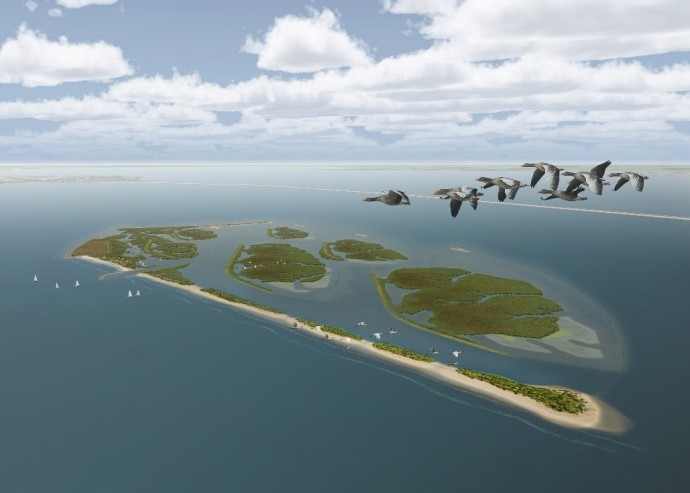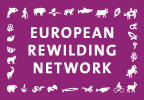The innovative and ambitious Dutch restoration project becomes the network’s 54th member.

Rewilding Europe are delighted to welcome one of Europe’s largest, most ambitious and most innovative nature restoration projects as the 54th member of the European Rewilding Network (ERN). Overseen by Dutch non-profit organisation Natuurmonumenten (the Dutch Society for Nature Conservation), the Marker Wadden project aims to restore part of Lake Marken (Markermeer), a 700 square-kilometre lake in the central Netherlands, boosting biodiversity through the creation of islands, marshes and mud flats from sediments that have accumulated in the lake.
![]() “We are really happy for this project to become part of the ERN,” says Philip Makkink, Natuurmonumenten’s leader of finance and fundraising for the Marker Wadden project. “We are looking forward to magnifying the beneficial impact of Marker Wadden by exchanging expertise and knowledge with other managers and stakeholders of European water bodies. The focus here is on identifying financial solutions that enable us to restore Markermeer’s wild nature and ecological functioning.”
“We are really happy for this project to become part of the ERN,” says Philip Makkink, Natuurmonumenten’s leader of finance and fundraising for the Marker Wadden project. “We are looking forward to magnifying the beneficial impact of Marker Wadden by exchanging expertise and knowledge with other managers and stakeholders of European water bodies. The focus here is on identifying financial solutions that enable us to restore Markermeer’s wild nature and ecological functioning.”
One of the largest freshwater lakes in western Europe, the Markermeer is a shallow lake with a depth of between 3 and 5 metres. It used to be part of the Zuiderzee, a saltwater inlet of the North Sea, which was dammed off in 1932.
Following the abandonment of a land reclamation project in the 1980s, the Markermeer became a valuable ecological and recreational asset. The lake is a Natura 2000 site, and an important breeding, resting and wintering habitat for numerous bird species. It is also home to wide range of fish species, on which many bird species depend.
Unfortunately the biodiversity of Markermeer has declined drastically over the last few decades. Due to the separation of the lake by dykes, sediment which was once carried away on currents now falls to the bottom of the lake, making the water turbid and negatively impacting fish and bird populations, as well as plants and molluscs.
The eventual aim of the Marker Wadden project, which began in 2014, is to create a 10,000-hectare archipelago of islands in the lake, using the fine sediment from the lake bottom. In a groundbreaking approach, a consortium of Dutch companies, including hydraulic engineering company Boskalis and the Department of Public Works of Rijkswaterstaat, are using ring dykes of sand to contain the sediment.
Facilitating the restoration of up to 100 square kilometres of lake, Marker Wadden’s archipelago of islands will provide a wide range of valuable habitats and solve the problem of siltation by changing water dynamics and creating deeper gullies where suspended silt can settle out. By improving water quality, this will also help to regenerate ecological productivity, boosting ecosystem functioning and benefiting many species of birds, fish and macrofauna. It will also benefit recreational activities on the lake.
Government funding is vital to the success of Marker Wadden, with the overall cost of the project estimated to be around €300 million. Construction of one island of 250 hectares has already been completed, while financing for the next four islands (representing the first project phase of 1000 hectares) has already been secured.
The Dutch, who are renowned across the globe for their expertise in hydrological engineering, are demonstrating through this project that nature-based solutions to water management problems are a viable and frequently better alternative to hard infrastructure. The Marker Wadden project, which will transform a large inland water body with poor ecological functioning into a lake teeming with life above and below the water, is a great example of a nature-based solution using rewilding principles. It’s a win-win for wild nature and man!
Join Europe’s burgeoning rewilding movement
 Rewilding Europe is part of an expanding pan-European rewilding movement which has seen many impressive and inspiring initiatives develop over recent years. With rewilding-related projects continuing to multiply and flourish across the continent, the objective of the European Rewilding Network is to connect, support and strengthen them. Launched in 2013, the network now contains 54 members (including Rewilding Europe’s eight operational areas), who together represent 25 European countries.
Rewilding Europe is part of an expanding pan-European rewilding movement which has seen many impressive and inspiring initiatives develop over recent years. With rewilding-related projects continuing to multiply and flourish across the continent, the objective of the European Rewilding Network is to connect, support and strengthen them. Launched in 2013, the network now contains 54 members (including Rewilding Europe’s eight operational areas), who together represent 25 European countries.
The ERN operates on a stronger together philosophy, promoting rewilding as a conservation approach. Members meet regularly via webinar to share knowledge, insight and examples of best practice. They can also take advantage of the recently launched ERN Forum, a real-time platform for exchange between members.
Rewilding Europe extends a warm welcome to all European rewilding initiatives who are interested in joining the ERN. Information on applying for membership can be found here.
